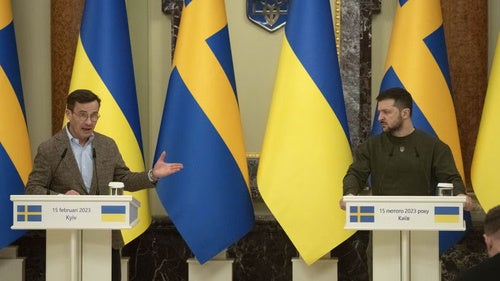Why is Sweden Telling its Citizens to Prepare for War?

As the country moves closer to joining NATO, member countries, including Poland and Germany, have said that within the next decade Russia could attack nations that have joined the military alliance.
In short: Sweden’s military commander-in-chief Gen. Micael Bydén said all Swedes should mentally prepare for the possibility of war as the country moves toward joining NATO. Member countries, including Poland and Germany, have said that within the next decade Russia could attack nations that have joined the military alliance. Bydén warned that “Russia’s war against Ukraine is just a step, not an end game.” Members of Sweden’s opposition party have criticized how the message was delivered.
Why did Sweden tell its citizens to prepare for war?
At an annual security and defense conference in Sweden on Jan. 7, the country’s civil defense minister, Carl-Oskar Bohlin, told attendees, “There could be war in Sweden.” Sweden’s chief of defense Micael Bydén echoed Bohlin, saying the Swedish population should mentally prepare for the possibility.
The Swedish defense officials’ concern was prompted by two recent developments: Sweden’s expected acceptance into NATO and increased threats from Russian President Vladimir Putin against neighboring NATO nations.
Finland and Sweden applied for NATO membership in May 2022, just months after Russia invaded Ukraine in February 2022. The move signaled a break from a history of neutrality for both countries. Sweden’s then prime minister, Magdalena Andersson, said at the time that Russia’s invasion threatened Europe’s security order and made Sweden’s need for guaranteed security granted through NATO membership apparent.
“Should Sweden be the only country in the Baltic Sea region that was not a member of NATO, we would be in a very vulnerable position. We can't rule out that Russia would then increase pressure on Sweden,” she said.
Finland’s membership was approved in April 2023, while Sweden’s is currently held up, awaiting approval from NATO member Hungary, which maintains ties to Russia. Turkey had also been holding up the Nordic country’s membership, but approved Sweden’s bid on Jan. 23.
Russia’s relationship with NATO has historically been tense, but tensions grew when the international alliance considered Ukrainian membership. After Finland’s acceptance into NATO, Russia warned the country would be “the first to suffer” if tensions between Russia and NATO worsen.
Sweden has been providing Ukraine with aid as it fights against Russia’s invasion, including donating tanks.
Other NATO countries have also warned of a potential Russian attack against member nations. Poland’s national security agency said Russia could attack NATO countries in less than three years, while Germany’s defense minister said the attack could occur in five to eight years.
How did Sweden react to the warnings?
Andersson, now leader of the Swedish Social Democratic Party, said that while there is a clear Russian threat to Sweden, the defense officials’ delivery was “divisive” and ineffective.
“A lot of people are very, very worried. So it’s important for the government to follow up on the communication that’s been going on,” she said. “This is a big responsibility for the government.”
Swedish commentator and journalist Göran Greider wrote in an op-ed in Swedish newspaper Dagens Nyheter that he believed the warnings showed “a secret longing to finally test the Swedish fighting forces,” and that the real message was: “Give us more money.”
After the warnings were issued, the Swedish civil contingencies agency, also known as MSB, said there was a 3,500% increase in visits to the agency's online bomb shelter map and a 900% increase in downloads of a pamphlet called “If crisis or war comes.”
A Swedish children’s rights organization, Bris, said that as videos of the top defense officials’ warning of war began circulating on TikTok, they experienced an uptick in calls to their mental health hotline.
“They should have provided information meant for kids when they come out with this kind of information for grown-ups,” Bris spokesperson Maja Dahl told the BBC.
In response to criticism over the warnings, Bydén said, “My ambition with this is not to worry people; my ambition is to get more people to think about their own situation and their own responsibilities.”
How did Russia respond?
Russia was also critical of the warning. Its embassy in Sweden wrote on X, formerly known as Twitter, “Perhaps the Swedish leadership should stop driving its own people towards paranoia?”
In the summer of 2023, Sweden accused Russia of backing a disinformation campaign meant to hurt the country’s image as it sought NATO membership.
Mark Galeotti, a senior associate fellow at the London-based Royal United Services Institute, told AFP that Russia targeting Sweden doesn’t seem likely.
“I understand that military structures have to think about worst case scenarios,” he said. “And Russia has demonstrated it to be more viciously aggressive than we had frankly anticipated. That said, I have to confess I'm skeptical about the odds of any kind of scenario like that emerging.”

